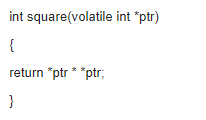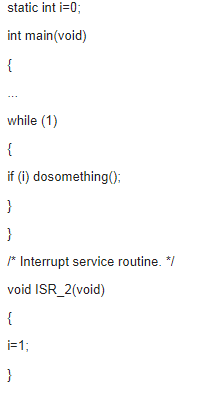A variable declared as volatile tells the compiler that the value of this variable may change unexpectedly, and therefore, it should not make any assumptions about its value. In other words, the optimizer must always read the variable's value directly from memory instead of using a cached copy stored in a register. This is especially important in scenarios where external factors—like hardware, interrupts, or other threads—can modify the variable without the program explicitly doing so.
Here are some common examples of when volatile variables are used:
1). Hardware registers (e.g., status registers) in peripheral devices
2). Non-automatic (global or static) variables accessed within interrupt service routines
3). Variables shared between multiple tasks in a multi-threaded application
If someone can't explain what a volatile variable is, they probably won't be hired for an embedded systems role. In my opinion, understanding volatile is one of the most basic distinctions between a general C programmer and an embedded systems programmer. Embedded developers often deal with hardware, interrupts, and real-time operating systems, all of which require the use of volatile variables. Not knowing this concept can lead to serious bugs or even system failures.
If an interviewee answers this correctly (which I doubt), I would then probe deeper to see if they truly understand the importance of volatile. For example:
1). Can a parameter be both const and volatile? Why or why not?
2). Can a pointer be volatile? Explain your reasoning.
3). What’s wrong with the following function?

Here is the answer:
1). Yes. A good example is a read-only status register. It's volatile because it can change unexpectedly, and it's const because the program shouldn’t attempt to modify it.
2). Yes. Although rare, a pointer can be volatile. For instance, if an interrupt service routine modifies a pointer to a buffer, it should be declared as volatile.
3). The issue with the function is that it reads the value of a volatile variable twice, which could result in different values due to external changes. This means the square function might not return the correct result. Here's the corrected version:
Long square(volatile int *ptr)
{
int a;
a = *ptr;
return a * a;
}
The original purpose of the volatile keyword is to indicate that a variable may be changed by external factors outside the program’s control. Compilers typically optimize code by reducing memory access, such as storing a variable in a register. However, when a variable is declared volatile, the compiler is forced to read from and write to the actual memory address every time, rather than using a cached value.

For example, consider a program where an interrupt sets a flag, and the main function checks this flag. If the flag is not marked as volatile, the compiler may read it once and store it in a register, never checking again. As a result, the main function may miss the change made by the interrupt. Declaring the flag as volatile ensures the compiler always reads the current value from memory.
Volatile is commonly used in the following situations:
1. Variables modified by interrupt service routines that are accessed by other parts of the program
2. Flags shared between tasks in a multi-tasking environment
3. Memory-mapped hardware registers, which can have different meanings depending on the context of access
In addition, when dealing with shared variables, data consistency is crucial. For example, when reading multiple related flags, you need to ensure they are read atomically to avoid partial updates. In some cases, disabling interrupts or task scheduling can help maintain consistency.
The key idea behind volatile is that it tells the compiler to always access the variable directly from memory, not from a register. This is essential in environments where external events can change the variable’s value at any time.
To summarize, the volatile keyword is not about the variable being "variable" in the traditional sense, but rather about ensuring that the program always accesses the latest value from memory, regardless of how the compiler optimizes the code. Understanding this distinction is crucial for writing reliable and efficient embedded systems code.
Phone Stand Holder Adjustable,Cell Phone Stand Holder,Phone Stand Holder Desk,Phone Stand Holder Hand,etc.
Shenzhen Chengrong Technology Co.ltd is a high-quality enterprise specializing in metal stamping and CNC production for 12 years. The company mainly aims at the R&D, production and sales of Notebook Laptop Stands and Mobile Phone Stands. From the mold design and processing to machining and product surface oxidation, spraying treatment etc ,integration can fully meet the various processing needs of customers. Have a complete and scientific quality management system, strength and product quality are recognized and trusted by the industry, to meet changing economic and social needs .

Phone Stand Holder Adjustable,Cell Phone Stand Holder,Phone Stand Holder Desk,Phone Stand Holder Hand
Shenzhen ChengRong Technology Co.,Ltd. , https://www.laptopstandsupplier.com